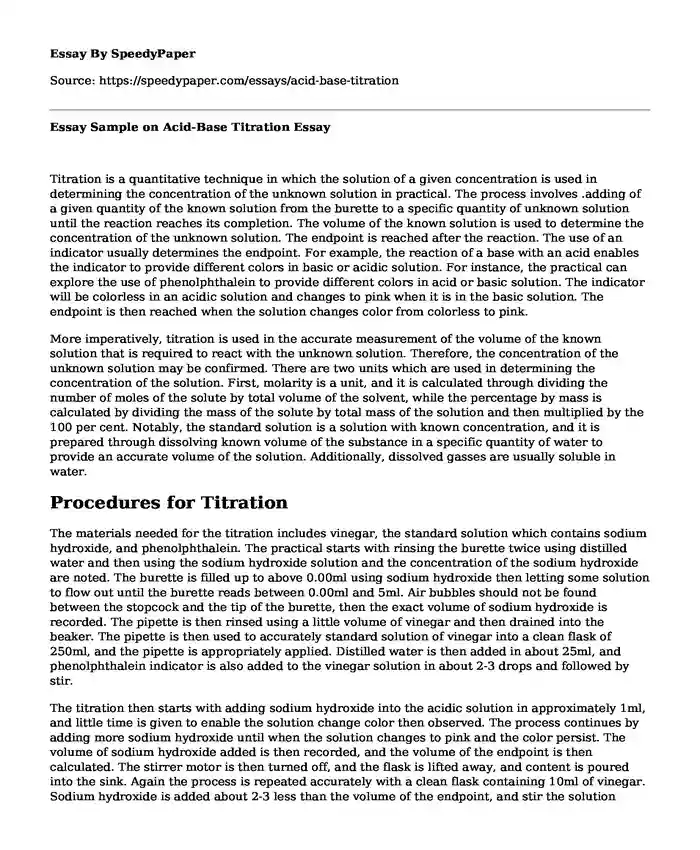Titration is a quantitative technique in which the solution of a given concentration is used in determining the concentration of the unknown solution in practical. The process involves .adding of a given quantity of the known solution from the burette to a specific quantity of unknown solution until the reaction reaches its completion. The volume of the known solution is used to determine the concentration of the unknown solution. The endpoint is reached after the reaction. The use of an indicator usually determines the endpoint. For example, the reaction of a base with an acid enables the indicator to provide different colors in basic or acidic solution. For instance, the practical can explore the use of phenolphthalein to provide different colors in acid or basic solution. The indicator will be colorless in an acidic solution and changes to pink when it is in the basic solution. The endpoint is then reached when the solution changes color from colorless to pink.
More imperatively, titration is used in the accurate measurement of the volume of the known solution that is required to react with the unknown solution. Therefore, the concentration of the unknown solution may be confirmed. There are two units which are used in determining the concentration of the solution. First, molarity is a unit, and it is calculated through dividing the number of moles of the solute by total volume of the solvent, while the percentage by mass is calculated by dividing the mass of the solute by total mass of the solution and then multiplied by the 100 per cent. Notably, the standard solution is a solution with known concentration, and it is prepared through dissolving known volume of the substance in a specific quantity of water to provide an accurate volume of the solution. Additionally, dissolved gasses are usually soluble in water.
Procedures for Titration
The materials needed for the titration includes vinegar, the standard solution which contains sodium hydroxide, and phenolphthalein. The practical starts with rinsing the burette twice using distilled water and then using the sodium hydroxide solution and the concentration of the sodium hydroxide are noted. The burette is filled up to above 0.00ml using sodium hydroxide then letting some solution to flow out until the burette reads between 0.00ml and 5ml. Air bubbles should not be found between the stopcock and the tip of the burette, then the exact volume of sodium hydroxide is recorded. The pipette is then rinsed using a little volume of vinegar and then drained into the beaker. The pipette is then used to accurately standard solution of vinegar into a clean flask of 250ml, and the pipette is appropriately applied. Distilled water is then added in about 25ml, and phenolphthalein indicator is also added to the vinegar solution in about 2-3 drops and followed by stir.
The titration then starts with adding sodium hydroxide into the acidic solution in approximately 1ml, and little time is given to enable the solution change color then observed. The process continues by adding more sodium hydroxide until when the solution changes to pink and the color persist. The volume of sodium hydroxide added is then recorded, and the volume of the endpoint is then calculated. The stirrer motor is then turned off, and the flask is lifted away, and content is poured into the sink. Again the process is repeated accurately with a clean flask containing 10ml of vinegar. Sodium hydroxide is added about 2-3 less than the volume of the endpoint, and stir the solution properly as sodium hydroxide is added drop by drop, and toward the endpoint, the solution should be added drop at a time. Finally, the last step is repeated to achieve around three accurate titrations and cleaning up the apparatus.
Cite this page
Essay Sample on Acid-Base Titration. (2023, Feb 23). Retrieved from https://speedypaper.com/essays/acid-base-titration
Request Removal
If you are the original author of this essay and no longer wish to have it published on the SpeedyPaper website, please click below to request its removal:
- Essay Sample about Early Childhood Curriculum. A Child's Connection to the World.
- Paper Example - Acceptance and Commitment Therapy
- Essay Sample: Why Do I Want to Enter the Dental Hygiene Profession?
- Essay Sample on Why Should Christians Study Secular Literature Discussion
- Essay Sample on Role of Chess in Education
- Free Essay: Conducting an Onboarding Process
- Free Essay Sample on Teaching Strategies for Students with Hearing Impairments
Popular categories





